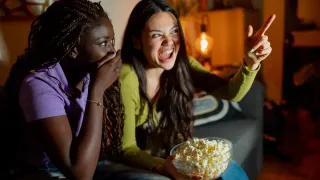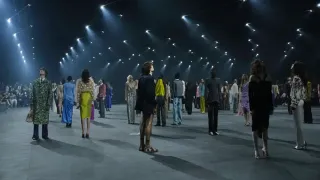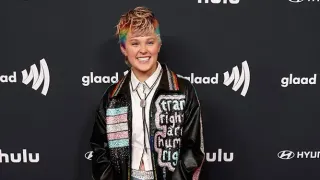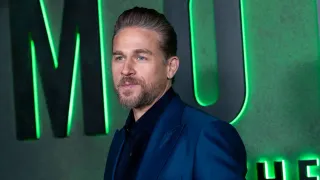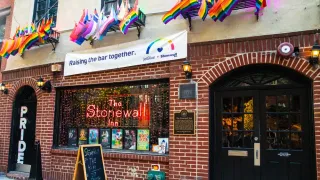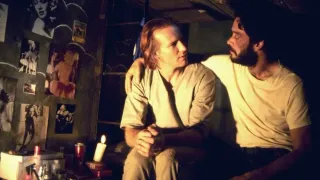November 9, 2014
'Virunga' :: Fighting for Congo
Kilian Melloy READ TIME: 3 MIN.
"Virunga" is 100 minutes of passionate documentary bursting at the frames to communicate to the world at large (including us jaded sophisticates) that what's at stake in Congo's biggest national park is nothing less than the future of environmental justice. What's going down in Virunga, a World Heritage Site, is no different from the fracking debacle, or the shameful topless Appalachians, or the dreaded Alaska pipeline. Do the planet a favor and at least watch Orlando von Einsiedel's debut feature "Virunga" on Netflix.
"Virunga" tells many interlocking stories simultaneously, being by turns history lesson, investigative journalism, nature documentary, and travelogue. This kaleidoscopic treatment is good for holding the attention of multitaskers, but might tax the comprehension of the more linear-minded, especially those ignorant of Congo history. A good place to start is Adam Hochschild's 1998 bestseller "King Leopold's Ghost." This primer in corporate evil circa 1885 details the savagery with which Leopold II, King of the Belgians, carved out an African colony for his own personal enrichment with the complicity of European and U.S. governments. Perhaps you've seen those photos of Africans with stumps instead of hands? This is that guy.
The resource grab started by Leopold continues today. Emmanuel de Merode, chief warden of Virunga National Park, is a Ph.D. in anthropology specializing in human ecology and an ardent conservationist. He is also a law enforcement officer in charge of a small army sworn to defend the park and its wildlife. Six months ago he took two bullets for the cause, one in the stomach, one in the chest. "It is a war," he said over strawberries at the publicist's. "We live in a state of war. We're at the center of it. You make a decision when you become a ranger. As the French say, C'est le risque du metier. [It comes with the territory.]" So far, 130 rangers have died in the line of duty.
The interview with de Merode and von Einsiedel was conducted half in English, half in French. It was all very pleasant and upmarket. The difference from almost every other arts interview I've done is, these guys daily risk their lives to defend the right of a national park to resist exploitation of its natural resources: Vegetable, animal, and mineral. Imagine rangers with rifles in the Grand Canyon. Imagine paramilitaries with tanks in Yosemite. Conservationists in the U.S. have lost so many battles without a shot being fired, it takes a minute to realize the implicit violence of Grand Theft Natural Resource.
The third man I was attempting to interview simultaneously was Andre Bauma, a park ranger tasked with being, as he says, a mother to young gorillas orphaned by war or poaching. Bauma's work with the endangered Mountain Gorilla is spectacular, and the species itself is worthy of its own film, but perhaps to present these great apes, so near and yet so far from human, in isolation from Congo's resource war would misleadingly fragment their reality. How humans exploit each other (war and slavery) is all mixed up with how we exploit the planet (pollution and habitat loss) and our fellow animals (slaughter and extinction).
The fourth main player in "Virunga," a young French investigative journalist named Melanie Gouby, has since left Congo and wasn't here to pitch the film. She strapped on a concealed microphone to interview operatives for U.K. oil giant SoCo, using her feminine wiles and heavily accented English to lull her unsuspecting subjects into telling the truth over a well-liquored dinner. One guy's a manager, the other a security subcontractor. They drunkenly empty their racist, neo-colonialist, anti-animal brainpans, saying, "That park's a fucking mine," and, "Who gives a fuck about a fucking monkey?" and, "The best for everyone would be to recolonize these countries." Also wearing a concealed mike is Rodrigue Katembo, who gets the local power-brokers to admit they're in it for an infinitesimal slice of a mega-payoff. Katembo, a child soldier turned ranger, has a haunted look verging on tears. After the filming, he was arrested and tortured, but has since returned to his post.
Thank Goddess for the rangers and their cool-headed commander Emmanuel de Merode, a human who makes me less ashamed to be a member of my species. A member of the Belgian royal family, which I guess means he's somehow descended from that excrescence Leopold, he assures me he's not working off any Belgian karmic debt, but feels a responsibility as a human. "We need to take a hard look at the reasons for the conflict in Congo. That is, the illegal exploitation of natural resources. This is unacceptable on a worldwide level." Truth.
